6 Ways to Improve Your Questioning Skills as a Manager

Having good questioning skills as a manager gives you a massive advantage in doing your job. Reasons why you should improve your questions skills as a manager include:
- Gives you a better understanding of the problems and challenges you face making it easier to solve or overcome them
- Enables better more robust solutions to be created
- Helps you find out a lot more about what is really happening in your team and company
- Increases the depth of your knowledge of the strengths and weaker areas of your team members, which in turn helps you manage the team better
- Helps you build better relationships by showing more interest in others
- Better questions get you better answers
- Knowing how to ask better questions gets you better decision making
And the list goes on. Learning how to use the right questions in different situations improves your effectiveness as a manager many times over.
You will be learning these 6 ways to improve your questioning skills:
- Know your Purpose before asking questions
- How to tailor your questions to your audience
- How to manage tone and body language when asking questions
- Suspend judgement for as long as possible
- Learn how to use silence
- Use Active listening and aim for action
At the end of the article, I will take you through 7 types of questions to use and in what situations to use each.
Watch on YouTube
Listen on Podcast
Asking questions are powerful. Questions get other people thinking. Questions guide and control the conversation. Questions can define problems. Questions help teach and correct. You can use questions in many situations to get a much better result that simply telling the individual.
Know your Purpose before asking questions – the first way to improve your questioning skills
Think about what you are trying to get from the situation before you start asking questions. Knowing your purpose will help you structure your questions better and improve your questioning techniques.
Some example purposes of using questions:
- Helps find out information
- To discover and understand the underlying problem
- To drive actions and solutions
- Helps solve a specific problem by using other people’s knowledge and skills
- To challenge others way of thinking, or their solutions
- To teach by getting the other person to question their assumptions or thinking
Changing the purpose will change the questions you are asking. For example, if you are finding out information the question might be:
“Tell me more about what ABC limited does and what problems are we solving for them?” [open question, expecting a broad answer]
Compared to if you were challenging a solution while using it as an opportunity to teach:
“That is one solution for ABC limited. What issues can you see with implementing that solution before the end of the month?” [open question, expecting an answer focused on identifying problems]
Compared to getting agreement on a particular solution:
“Does Solution C for ABC limited meet all the criteria we set out at the beginning of this workshop?” [Closed question, aimed at getting agreement or a yes]
Working out your Purpose before asking questions will definitely improve your questioning skills.
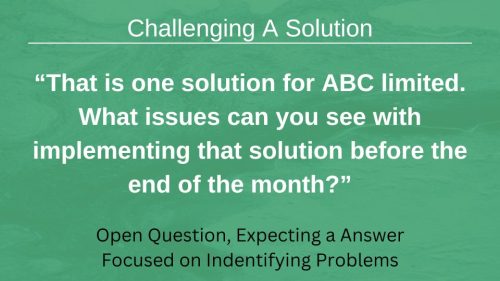
Tailor your questions to your audience – the second way to improve your questioning skills
Asking questions in a conversation with the CEO is likely to be very different to asking questions of a junior worker. Your audiences are very different.
You might ask the CEO who is time poor and knowledgeable
“What exactly do you want delivered from Finance to increase our gross margin by 5%?”

You might ask the junior who has more time and less business knowledge the following question sequence:
- “What did you do over the weekend with your family?”
- “What is your key focus over the next week?”
- “How do you think you could help the finance team reduce costs or time spent in the areas you look after?”
- “What help would you need to implement your best suggestion?”
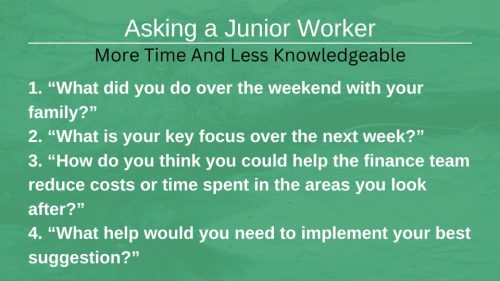
Before asking questions, think about your audience and consider:
- How much time they have
- What they might expect in terms of pleasantries or relationship building
- The knowledge they have
- What their motivations and interests are
- What they can or do influence and control
- The language they understand and use
- What their mood might be
And any other areas that help you understand and tailor your questions to your audience.
Do your best to tailor your questions to your audience and you will get better answers.
Manage tone of voice and body language – the third way to improve your questioning skills
The spoken words account for around 7% of the message. The non-verbal components massively impact HOW the works spoken are interpreted. Tone and pace of the voice makes up around 38% of the communication, with the remaining 55% is communicated by body language.
How you use your body language and tone of voice can easily change the question being asked from
A friendly enquiry to increase the manager’s understanding
To something like
An accusatory question implying poor performance, likely to get a defensive or aggressive response.
When asking questions, be conscious of:
- The tone and pace of your voice for example using a neutral tone expressing curiosity and excitement for learning
- The pauses and the words we emphasise
- Our mood – if we are annoyed, upset or have negative emotions, how do we keep these out of our tone and body language
- Our facial expressions and use of eyes e.g. show interest, openness, and willingness to take in the reply to our question
- How we hold our bodies e.g. attentive, engaged, respectful
The more interest we show in the answer through actively listening to the other person and the more we think about the answer and consider it, the more likely our question will be answered with effort and thought.
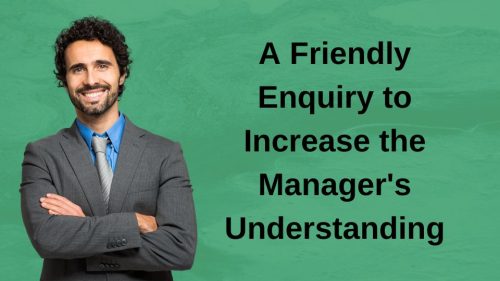
suspend judgement for as long as possible – the fourth way to improve your questioning skills
We all judge. We all have our opinions, our beliefs, and our reference points.
It takes effort to really take in what the other person tells us. To consider it, to reflect on it. That effort shows on our faces and in our reactions when we listen the reply to our question. This is gold dust to those replying and they put in more effort into their replies.
Even more importantly, if we take in the reply to our question, if we consider it, we are in a better place to understand their point of view. Better understanding reduces conflict and increases the ability for both parties to learn. This process helps us adapt our thinking, which helps us be more successful as managers.

Learn how to use silence – the fifth way to improve your questioning skills
Silence is an incredibly useful tool when asking questions. We all find the silence that follows a really good question uncomfortable. Yet if you want to get a good answer staying silent and giving the other person the time to think without being interrupted is a must.
Don’t be tempted to repeat the question or reframe the question until you have given the other person plenty of time to think and respond.
Being silent also increases the pressure on the other person to respond to your question. Practice using silence when asking questions and get comfortable with silence yourself.
Actively listen and aim for action – The sixth way to improve your questioning skills
Using active listening skills is a must to get good at asking questions. You should pay attention to their tone and pace of voice, their facial expressions, and their body language when they are answering.
If they answer quickly, if they appear to have spent very little thought before answering, then they are probably answering with what they know or think you want to hear. For information gathering questions, this is usually fine.
What about problem solving questions? What about questions where you are asking them to challenge the status quo? What about questions that ask them to step into their unknown?
Would this reaction be okay?
The best questions usually get the other person thinking. Thinking and considering takes effort and you will see this in their face and body language. Keep asking different questions until you see that they are thinking. And remember what wording got them there for asking future questions.
Good questions often initiate action. Good questions could highlight an issue or gap within the other person area of responsibility. If you have asked the question with curiosity, they are likely to consider the question, realise there is a gap they hadn’t spotted and then resolve to take action to fix it.
Always pay attention to the non-verbal messages the other person is giving off and try to ask questions that generate action – i.e. getting the other person thinking or taking literal action.
So we have gone through six actions to take to improve your questioning skills. I am going to run through 7 question types for you to practice using.

Types of questions to Ask
1 Closed Questions
Closed questions generally only allow for a short response such as yes or no, or to choose from a short list of possible answers. An example could be choosing sweet flavours. Closed questions are good for narrowing down topics and getting to decisions.
2 Open Questions
Open questions allow for a wide response such as giving opinions, options, views, solutions and more. Open questions are great for learning about the other person or particular subject or area.
Open questions often start with or include:
- What
- Why
- When
- How
- Tell me
- Please expand on…
Examples include
- What are your views on customer ABC limited?
- How would you go about increasing the profitability of customer ABC
3 Leading Questions
Leading questions encourage the other person to give you an answer you want. Leading questions limit the answers or put pressure on to give a certain answer. Examples include
- James, I really like Option 2. What do you think?
- How satisfied are you with our product?
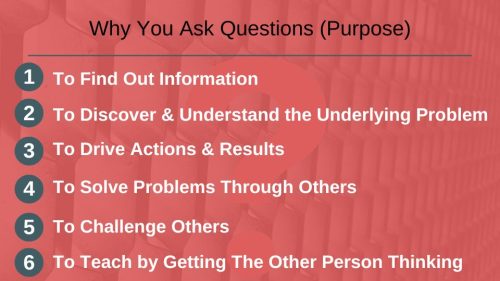
4 Probing or clarification questions
Probing questions get the other person to think more deeply before giving an answer. Probing questions are often used to expand on an answer previously given. An example
Thanks for sharing that customer ABC is unhappy. Please expand on what is making customer ABC unhappy?
The questioning technique of Asking Why 5 times is a good use of probing questions. You keep asking why until you really understand a situation or have gotten to the bottom of it.
5 Funnelling questions
Asking a series of questions that become more restrictive at each step or vice versa. You usually start with open questions, move into probing questions, and then use closed questions. Funnelling questions are good to focus in on and find out more details on particular areas
- What are your looking for? [An open question]
- Has this happened before? [Probing question]
- Do you agree? [ closed question]
6 Justification Questions
Justification questions asks the other person to provide evidence or examples to support their ideas.
An example
What evidence do you have to support your view that we should stop supporting ABC Limited?
7 Reframing questions
Reframing questions aim to shift the perspective of the other person. These are good if a person is stuck or would benefit from a different way of looking at things.
For instance, if a person has been complaining about their day, a simple reframing question might be
That sounds pretty tough. It would be great if you also tell me what has gone well today?
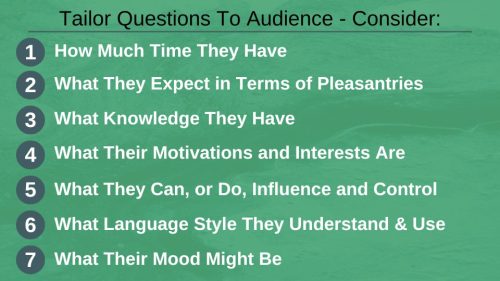
So there you have 7 different types of question to practice using in different situations.
in summary
There are many ways to improve your questioning skills as a manager and we have gone through six today being:
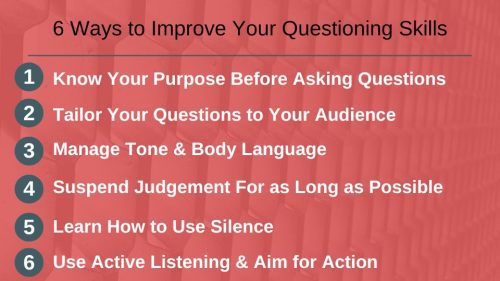
Getting good at asking questions and listening and taking in a person’s responses is great to help both parties learn. Questions can be used for all sorts of purposes. Start experimenting with how you use questions when managing your team.

Learning how to ask the right questions at the right points is an incredible useful skill. Questions get the other person talking – about themselves, about their role, about what they do and don’t know. You can learn so much which directly helps you do a better job as a manager.
Practice asking more questions at work, learn more and get better as a manager as a result.






